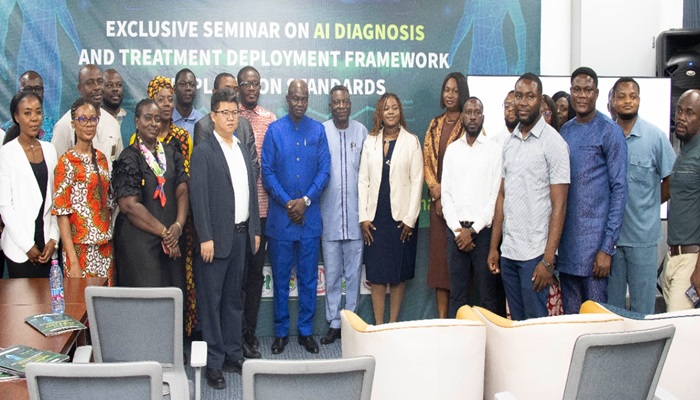The Director-General of the Ghana Health Service (GHS), Professor Samuel Kaba Akoriyea, has announced that the GHS is poised to integrate Artificial Intelligence into its operations nationwide to enhance healthcare delivery and improve patient outcomes.
Speaking at a seminar on AI Diagnosis, Treatment Deployment, and Framework Development held in Accra on Friday, February 21, 2025, he outlined several strategic steps being taken to facilitate the seamless adoption of AI across the country.
According to the newly-appointed Director-General, AI is transforming the global healthcare landscape, and Ghana must not be left behind. He commended the Health Community of West Africa (HCOWA) Association and its partners for organizing the seminar, which highlighted the advantages and potential benefits of nationwide AI implementation.
“Artificial Intelligence is crucial for enhancing healthcare outcomes, improving diagnostic accuracy, and optimizing treatment methods,” Professor Akoriyea stated.
He explained that AI applications in healthcare include advanced medical imaging and diagnostics, where AI-powered computer vision and neural networks analyze data from X-rays, CT scans, MRIs, PET-CT scans, ultrasounds, and pathology slides.
Professor Akoriyea detailed that GHS is revising its enterprise architecture to ensure it is robust, scalable, and capable of supporting AI-driven solutions.
This initiative includes updating the IT infrastructure to accommodate advanced AI technologies and ensuring compatibility with existing systems, thereby laying a solid foundation for AI adoption across the healthcare ecosystem.
He further emphasized that the Ghana Health Service (GHS) is actively developing an interoperability layer designed to facilitate seamless communication between various health information systems.
This initiative aims to ensure efficient data flow across platforms, enhance collaboration among healthcare providers, and create a unified healthcare network where patient records, diagnostics, and treatment plans can be accessed securely and in real-time.
Additionally, he underscored the critical need for data security, revealing that GHS is implementing advanced security monitoring systems to provide real-time threat detection, safeguard sensitive patient information, and ensure compliance with global cybersecurity standards.
In an era of increasing cyber threats and data breaches, he noted that these proactive measures are essential to maintaining public trust, strengthening the resilience of Ghana’s healthcare infrastructure, and ensuring the ethical use of AI-driven healthcare solutions.
On framework development, the Director-General recommended adopting global best practices for advancing AI in healthcare.
“Together with stakeholders, we can adopt or consider the UNESCO Recommendation on the Ethics of AI, known as the RAM Framework,” he explained.
He added that this framework would establish a structured approach to AI ethics and governance, emphasizing fairness, inclusion, transparency, accountability, and strict security measures.
Emphasizing that AI will not replace healthcare professionals but rather serve as a critical tool to enhance their effectiveness, Professor Akoriyea urged all stakeholders to embrace AI responsibly.
At the close of the seminar, HCOWA reaffirmed its commitment to partnering with GHS to drive AI adoption, underscoring that such innovation is key to transforming healthcare delivery not only in Ghana but across the entire West African sub-region.
Highlighting the broader economic potential of AI, Mr. Anthony Ameka, CEO of the Federation of Africa Medical Equipment Disposables and Devices Manufacturers and Suppliers, noted that AI is projected to add $15.7 trillion to the global economy by 2030. He elaborated on how AI can stimulate economic growth, drive innovation, create new industries, and generate employment opportunities across Africa.
“AI can help solve some of Africa’s most urgent healthcare challenges, while also preserving cultural heritage and generating new business opportunities,” he explained.
Adding her voice to this transformative vision, Ms. Liu Suhua, Chief Secretary for the China region of the HCOWA Association, reiterated the organization’s commitment to fostering AI-driven healthcare transformation in West Africa. She underscored HCOWA’s pivotal role in bridging technological gaps, ensuring that AI integration adheres to healthcare standards, and enhancing patient outcomes.
“The HCOWA Association is poised for transformative change in the healthcare industry. By establishing clear deployment frameworks and fostering cross-border collaboration, we are setting the stage for AI-driven medical advancements,” she said.
Experts at the seminar stressed the importance of adhering to regulatory standards set by the Health Facilities Regulatory Agency (HeFRA) and the Food and Drugs Authority (FDA) to ensure patient safety and ethical use of AI. The event concluded with a strategic roadmap for AI adoption, which includes compiling key outcomes into an official document for stakeholder reference, followed by an extensive review and feedback process involving policymakers, medical institutions, and technology developers.
By PRINCE O. DOGBEY, Accra
GHS D-G hints of integrating AI into its operations





